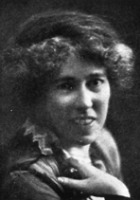Victoria Grace Blackburn
Victoria Grace Blackburn Poems
Above the sunset's many-tinted bar,
Where light on light, a smiling iris gnar,
Mellows to mystery of near and far,
Swings passionately pale the Evening Star!
...
Dead with his face to the foe!'
From Hastings to Yser
Our men have died so.
The lad is a hero–
...
Along the sea shore, surf-beaten and brown,
The Fisher-Lass hastes to the Fishing-Town,
In kirtle of blue and bodice of red,
The sun at its nooning over her head,
...
Disdainful Earth!
Hooded in clouds and snowdrifts–
Great gray Earth,
That shivers and gathers her garments!
...
Out of the clod of earth
That holds me to this melancholy place,
As ancient servitors
Held flambeaux for their lords
...
Clash the cymbals!
String the harp and sound it–
Cymbals and harp, there, you Makers of Music!
...
Victoria Grace Blackburn Biography
Victoria Grace Blackburn, journalist, poet, playwright, novelist (b at Quebec City, 17 Apr 1865; d at London, Ont 4 Mar 1928). Born in Quebec City, Blackburn attended Hellmuth Ladies' College in London, Ontario. After graduation she worked as a teacher in Faribault, Minnesota and as principal at the Diocesan School of Northern Indiana in Indianapolis. Following her work in education, Blackburn moved to New York to study journalism, theatre and dramatic criticism. In 1896 she returned to London, Ontario and worked for the London Free Press, a newspaper owned by her father, as a literary and dramatic critic. Blackburn became an assistant managing editor in 1918, and worked at the Free Press until her death in 1928. In addition to her work as a journalist, Victoria Grace Blackburn wrote numerous poems, 2 single-act plays and a novel. Her poetry explores themes such as ill-fated love, varies in form from satire to tragedy, and shows Blackburn's interest in foreign locations for her settings. Blackburn's plays evidence her interest in both personal and social matters. Seal of Confession explores ideas of self-sacrifice through the perspective of a French priest, and The Little Gray shows Blackburn's reflective side as it mocks her own social class and its fascination with fashion and aesthetics. Neither play was officially published, but Blackburn's hand-written scripts are currently held at the Archives and Research Collection Centre at the UNIVERSITY OF WESTERN ONTARIO. Blackburn's most critically acclaimed work, The Man Child (1930), takes a much more serious tone than her previous works. Published 2 years after her death, the novel follows Jack Winchester, a Canadian boy who leaves London for the trenches of France during WORLD WAR I. The novel extols the virtues of the war volunteers and the Allied armies. It is not a novel praising war, however. Instead, The Man Child celebrates the soldiers and their dedication to the cause. Blackburn plays with form throughout her novel, switching from a traditional narrative structure to an epistolary one as the story moves from London to France. This change in form not only demonstrates Blackburn's skill as a writer, but also mirrors the change in her protagonist as war becomes a personal experience and not just something read about, thousands of miles away. Victoria Grace Blackburn was one of the founders of London's Women's Canadian Club, and served as its president from 1918-1919. She also served as president of the London Women's Press Club (1921-1923).)
The Best Poem Of Victoria Grace Blackburn
The Evening Star
Above the sunset's many-tinted bar,
Where light on light, a smiling iris gnar,
Mellows to mystery of near and far,
Swings passionately pale the Evening Star!
Queen of the twilight–from a conquered sky
She smiles to see the Day grow faint and die.
